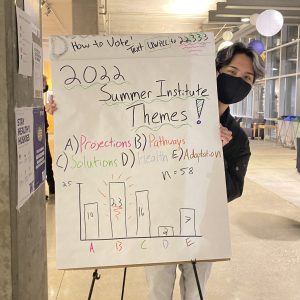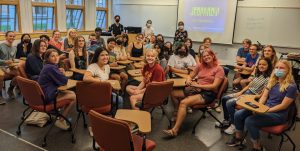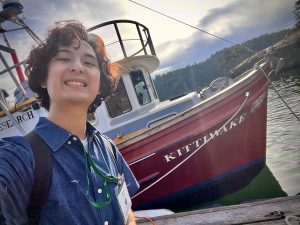Where We Go From Here – A Youth’s Reflections on Moving Towards Action as a Community
My name is Isaac Olson, and 4 years ago, I was a lot more naïve.
In December 2020, I was still in my first year as an undergraduate at the UW, barely aware of what my future degrees would be. I had no idea that I would still be at the UW after 4 years, having gotten bachelor’s degrees in both Oceanography and Environmental Studies, and now pursuing a master’s degree with the School of Marine and Environmental Affairs.
In December 2020, I had just been accepted as an Undergraduate Assistant for the Program on Climate Change, unaware that I would stay with the PCC until June 2024, my entire undergraduate career, making me the longest serving Undergraduate Assistant in the program’s history.
And in December 2020, I was anticipating a presidential transition, unaware that in only a few weeks, I would witness an insurrection at the U.S. Capital, and that 4 years later, the man who oversaw that insurrection would again be elected as president on a platform of reversing climate action, even as climate impacts have become increasingly prevalent and deadly.
 I am left looking back on the past 4 years, trying to grapple with the pace of progress. I am thankful for everything that I was able to positively contribute to during my time with the PCC, and the climate action I witnessed through both research and policies. I am particularly proud of the growth that has occurred during my time working as an Undergraduate Assistant.
I am left looking back on the past 4 years, trying to grapple with the pace of progress. I am thankful for everything that I was able to positively contribute to during my time with the PCC, and the climate action I witnessed through both research and policies. I am particularly proud of the growth that has occurred during my time working as an Undergraduate Assistant.
I have experienced significant personal growth working in this Program, being able to connect with peers and professionals in the climate sciences, engage in new aspects of addressing climate science, and seek out new opportunities. The PCC is a place that brings together community in a way that particularly benefits early career scientists who are attempting to understand the world of climate science, forge new connections, and broaden horizons. I am thankful to have experienced so much of this development myself. The lessons I have learned and the connections I have gained will stick with me throughout my career.
 Meanwhile, I have seen and contributed to the significant growth of the Program’s undergraduate initiatives. In the past, the PCC has not always been able to effectively engage undergraduate students, which is a shame, because the youth represent the future of climate science and climate action. Targeted expansion of undergrad-focused outreach and events has led to the major multiplication of interest in the Climate Science Minor, and engagement with dozens of undergraduates through the Undergraduate Cohort. I am proud of the relationships, advice, and education we have facilitated during my time with the PCC, laying the groundwork for the next generation of climate scientists to enhance their professional development.
Meanwhile, I have seen and contributed to the significant growth of the Program’s undergraduate initiatives. In the past, the PCC has not always been able to effectively engage undergraduate students, which is a shame, because the youth represent the future of climate science and climate action. Targeted expansion of undergrad-focused outreach and events has led to the major multiplication of interest in the Climate Science Minor, and engagement with dozens of undergraduates through the Undergraduate Cohort. I am proud of the relationships, advice, and education we have facilitated during my time with the PCC, laying the groundwork for the next generation of climate scientists to enhance their professional development.
And yet, during my years at the PCC, I have also seen a more demoralizing form of growth. I have seen growth in the scale of the threat facing our present and future. I have seen month after month of record temperatures, record highs atmospheric CO2 levels, and unprecedented human cost of the disaster. I have seen a growth in feelings of climate apathy and grief, especially among the youth who have seen older generations deny or delay in the face of crises. And despite youth speaking out about the urgency of the impending threat, I have seen those with power treat us with condescension, even as our futures are used as talking points. Instead, we are treated as uninformed or unrealistic in our demands for a better future – put simply, we are seen as too young to make change. That is why it is so important for older generations, including our professors and mentors, to continue to provide us the resources for development, and to willingly advocate for the causes that will contribute to a more just world, even if they expand beyond the science of climate change.
The desire to engage with climate change purely through the lens of Western science limits the potential for an equitable, sustainable future, and all too often casts aside the principles of environmental and climate justice, enabling the sacrifice of beings deemed unworthy of protection. This flawed approach has plagued the American environmental movement since its origin, when an ideal towards conservationism simultaneously advanced racist and sexist goals. The lack of tangible progress on climate mitigation and adaptation thus far further reflects this shortcoming, as despite scientific evidence of human-driven climate change dating back decades, those with power refused to take substantive action, often for personal gain and societal loss. We continue to grapple with this issue today: it is seen at a global scale in the willingness of Western nations to sacrifice the people and ecosystems most vulnerable to (and least responsible for) climate change and on a smaller scale in the stagnancy in minority representation in the geosciences, especially in positions of power, something that has continually affected me as a person of color in the marine sciences. As long as scientists are willing to treat justice and societal action as secondary targets, we will continue to see the opportunity to secure a habitable future slip away. To rectify this requires scientists to not only address environmental justice in their work, (which is, of course, incredibly important), but also to go beyond science – to use their knowledge to engage in communication, advocacy, and action to demand a future in a world that is seemingly content with its history.
We ask that more of those in the scientific community follow the youth’s lead. We are more diverse, more active, and more intersectional than ever before. We are disproportionately passionate about equity and justice, despite the unprecedented hardships of our formative years, with existential threat followed by existential threat on the horizon. And we are pleading that those who can continue to offer their academic guidance, but also stand up for the various intersectional causes that are so vital to our ability to thrive, from confronting the environmental destruction in Palestine to the disproportionate sacrifice of BIPOC communities. Engaging with such issues not only broaden the base of environmentally aware members of the public, but also acknowledge the simple truth that climate justice is not possible without social justice, and that the youth who are more diverse in their identities and interests than ever before are not willing to sacrifice people and planet in any capacity.
This is why it is so important that the PCC continues to offer opportunities to undergrads and high schoolers, giving us the experience and confidence needed to actualize the change that is so urgently required, while also being willing to promote those values itself, standing up for climate justice through its initiatives and statements. Throughout my time at the PCC, my growth was constantly facilitated by my mentors being willing to trust in the passion of the youth to actualize change and to support causes in more than just words.
On behalf of all the youth who are advocating for a brighter future, I ask that you not only teach, but trust and take action for the sake of tomorrow.
Written by Isaac Olson
Isaac is a graduate student in the School of Marine and Environmental Affairs, focusing on environmental communication on threats to coastal communities. He is a student assistant for Washington Sea Grant and a member of the PCC Graduate Steering Committee (P-GraSC). Isaac lives on the ancestral homelands of the Coast Salish people, including the Duwamish and Suquamish Tribes, who have stewarded the lands and waters since time immemorial and form the historic and ongoing source of all environmental action in this region.
